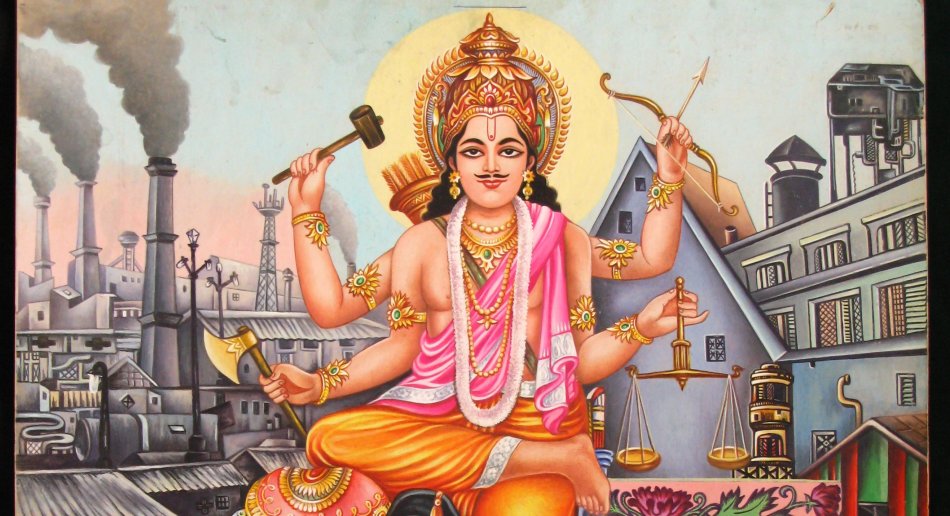- Tid:
- Sted: Auditorium 2
- Legg til i kalender
Image: Vishwakarma. Painting and print by Nemai Das, mid-1970s. Photograph courtesy of Priya Paul and the Priya Paul Collection.
Technophany and the Sacralisation of Infrastructure in India and Thailand
The rise of industrial capitalism in South and Southeast Asia since the late 19th century has been accompanied by rites that aim to bring emerging infrastructures, technologies, and objects of manufacture into alignment with the cosmos. Most prominent among these rites are those tied to the worship of the Hindu-Buddhist deity known in India as Vishwakarma, and in Thailand as Witsanukam. This god and his manifestation in ritual do not stand outside of technological practices and assemblage, but occasion a time of “technophany,” a time in which societies of technical ensembles and beings are made visible and wondrous to devotees and their publics. Using the conceptual framework of technophany, and drawing from historical study and team-based ethnographic fieldwork in both India and Thailand (2017-2019, and 2022), this comparative look at Vishwakarma worship calls for a rethinking of frameworks that would treat religion and technology as ontologically distinct domains.
Ken George (Ph.D., University of Michigan) is Professor Emeritus of Anthropology in the ANU College of Asia and the Pacific at the Australian National University, having served previously at the University of Wisconsin-Madison, Harvard University, and as Editor of the Journal of Asian Studies (2005-2008). His earliest work on religion and culture focused on the role of conversion narratives in the homiletic traditions of Appalachia’s evangelical churches. Ken began his ethnographic and historical research on religions in Asia with a decade of work on the cultural politics of ritual violence in highland Sulawesi, Indonesia. He subsequently conducted a long-term collaborative project on contemporary Islamic art and art publics across Southeast Asia. His research has been supported by the Social Science Research Council, the Wenner-Gren Foundation, the Aga Khan Trust for Culture, the John Simon Guggenheim Foundation, the National Endowment for the Humanities, and the Institute for Advanced Study, Princeton. Ken’s books include the prize-winning Showing Signs of Violence: The Cultural Politics of a Twentieth-Century Headhunting Ritual (1996); Spirited Politics: Religion and Public Life in Contemporary Southeast Asia (2005, co-editor); and Picturing Islam: Art and Ethics in a Muslim Lifeworld (2010). His current research with Kirin Narayan on the intermingling of religion and technology in India has been supported by the American Institute of Indian Studies, the USIEF Fulbright Program, and an Australian Research Council Discovery Project Award.
Please join us in person in Auditorium 2, or watch on Zoom: https://mf-no.zoom.us/j/64105595003?pwd=S0JpdTIyT1dBcjRwTjg2YzVxdmVRQT09
This lecture is sponsored by the MF Research Group MYTHOPOL: Mythopolitics in South Asia

